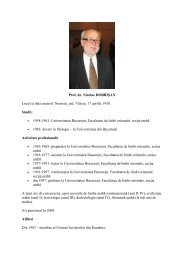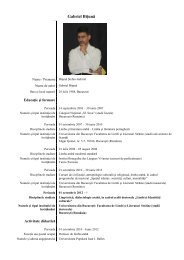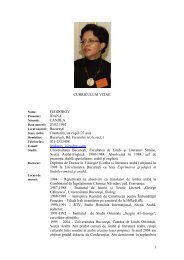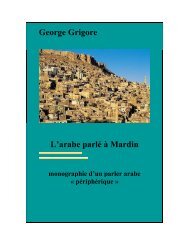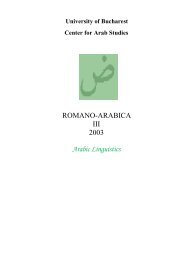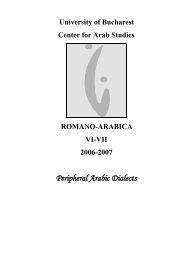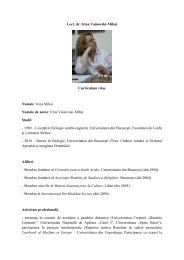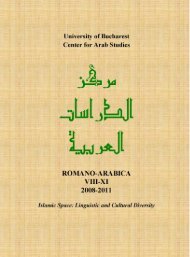12 55 Years of Arab Studies in Romania - Secţia de Arabă
12 55 Years of Arab Studies in Romania - Secţia de Arabă
12 55 Years of Arab Studies in Romania - Secţia de Arabă
You also want an ePaper? Increase the reach of your titles
YUMPU automatically turns print PDFs into web optimized ePapers that Google loves.
or miss”.<br />
fāq (yfīq) “to wake up” 25 < ʔafāqa (yufīqu) “to recover, to wake up”.<br />
qāl (yqīl) “to leave alone; to grant a cancellation <strong>of</strong> sale; to fire, to dismiss” 26 <<br />
ʔaqāla (yuqīlu) “to cancel, to dismiss; to free, to release”.<br />
kra (yĭkri) “to rent” 27 < ʔakrā (yukrī) “to rent, to lease”.<br />
lhəm (yĭlhəm) “to <strong>in</strong>spire, to give <strong>in</strong>spiration to” 28 < ʔalhama (yulhimu) “to make<br />
swallow; to <strong>in</strong>spire”.<br />
mla (yĭmli) “to dictate” 29 < ʔamlā (yumlī) “to dictate”.<br />
ngəs (yĭngəs) / ndəs (yĭndəs) “to make unclean, to soil” 30 < ʔanğasa (yunğisu) “to<br />
soil, to pollute”.<br />
nšəd (yĭnšəd) “to s<strong>in</strong>g, to recite” 31 < ʔanšada (yunšidi) “to s<strong>in</strong>g, to recite”.<br />
nša (yĭnši) “to build, to raise; to start” 32 < ʔanšaʔa (yunšiʔu) “to build, to start”.<br />
ns}əf (yĭns}əf) “to be just. to treat with justice” 33 < ʔans}afa (yuns}ifu) “to be just”.<br />
nfəq (yĭnfəq) “to buy food or provisions, to provi<strong>de</strong>” 34 < ʔanfaqa (yunfiqu) “to<br />
spend (money); to provi<strong>de</strong>”.<br />
hlək (yĭhlək) “to cause much harm to, to endanger, to ru<strong>in</strong>” 35 < ʔahlaka (yuhliku)<br />
“to ru<strong>in</strong>, to <strong>de</strong>stroy”.<br />
hməl (yĭhməl) “to neglect, to give the cold shoul<strong>de</strong>r to” 36 < ʔahmala (yuhmilu) “to<br />
neglect, to omit, to disregard”.<br />
24 DAF 10: 130-132 (“faire perdre; manquer à qqn.”); TAR 2: 602. ME (37) quotes only fqəd “to<br />
lose” (< faqada, form I).<br />
25 DAF 10: 198; ME 32. TAR 2: 615-616 (“ce verb est la forme IV e classique قافأ qui, ayant<br />
perdu l’alif hamzé <strong>in</strong>itial, est <strong>de</strong>venu en tout po<strong>in</strong>t une I ère forme dialectale avec les dérivés et<br />
composés correspondants à cette première forme”); DAM 51.<br />
26 DAF 10: 485; ME 108 (qālūh mən l-məns}ĭb dyālu “they dismissed him from his position”);<br />
TAR 2: 683 DAM 85.<br />
27 DAF 10: 571; ME 64 (l-bārəh} kra dāk d}}}-d}}}ār l-xāy “yesterday he rented that house to my<br />
brother”).<br />
28 DAF 11: 93; ME 70 (r}əbbi ləhmu h}ətta dāz mən hād ž-žīh “God gave him the <strong>in</strong>spiration to<br />
come this way”).<br />
29 DAF 11: 253; ME 81 (āži l}l}āh yxăllīk mli ʕlĭyya hād əl-qīt}ʕa “please dictate this excerpt to<br />
me”).<br />
30 DAF 11: 317 (“polluer, salir”); ME 101 (quotes only ngəs). Regard<strong>in</strong>g the shift ğ > d/g <strong>in</strong><br />
Moroccan <strong>Arab</strong>ic cf. Cant<strong>in</strong>eau 1960: 61; Heath 2002: 136-138; Aguadé 2003: 70 and 84.<br />
31 DAF 11: 363; ME 104.<br />
32 DAF 11: 370; ME 104 (transcribes nšəʔ, with f<strong>in</strong>al hamza); TAR 2: 773.<br />
33 DAF 11: 381 (hād l-h}ākəm ka-yĭns{əf bīn n-nās “ce chef est equitable envers les gens”).<br />
34 DAF 11: 431; ME 100 (nhār} s-səbt ka-nnəfqu l-l-ʔŭsbūʕ kāməl “on Saturdays we buy food for<br />
the whole week”); DAM 109.<br />
35 DAF <strong>12</strong>: 72-73; ME 54 (hlək r}ās}u “to put oneself <strong>in</strong> a dangerous situation”); DAM 67.<br />
36 DAF <strong>12</strong>: 83; ME 54; DAM 67.<br />
10



